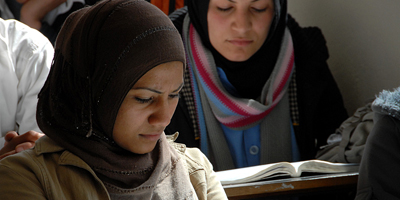Gender equality and the empowerment of women and girls are essential conditions for the eradication of poverty and the construction of a global society based on sustainable development, social justice and human rights. Gender equality is one of the fundamental goals of Italian development cooperation (Law no. 125/2015 art. 1, sect. 2) and is therefore included among the sectorial priorities defined by the Three-Year Document of Programming and Orientation.
At the strategic level, the “Guidelines on Gender Equality for Women and Girls (2020-2024)”, define the principles and operating methods for action by the AICS in the sector, including several concrete, ambitious goals. In line with the 2030 Agenda, which recognizes the central importance of advocating gender equality, not only to guarantee fundamental rights and freedoms to women and girls, but also for the attainment of all 17 of the Sustainable Development Goals, the Agency takes a two-track approach in the sector, financing actions specifically aimed at reducing gender inequality and integrating the gender dimension in other initiatives. In this connection, the guidelines provide a target on the financing of specific initiatives (at least 10% of the voluntary contributions and 10% of the initiatives already programmed) and on mainstreaming, through the systemic use of the gender marker policy of the OECD-DAC, as well as strengthening gender analyses.
Moreover, the guidelines specify that the most important issues for Italian cooperation are gender violence and the rights of women and girls; empowerment and the private sector; agricultural development, food security and climate change; sexual and reproductive health; education and professional training; humanitarian aid and situations of fragility,
The Agency also participates actively in the Gender Action Plan III (GAP III), the European Union’s plan of action on gender equality – which has an ambitious agenda for gender equality and the empowerment of women in all the external action of the EU. In particular, GAP III insists on the need to guarantee the coherence of internal and external policies, advocating for cultural change institutionally, within the EU (so-called “lead by example” approach), and indicates three fundamental principles: the gender-transformative approach, focused on producing positive changes on the socio-economic, cultural and institutional paradigms underlining gender discrimination; the intersectional approach, which assesses multiple discriminations; the approach based on human rights.
AICS is also very active in the field, with numerous projects targeted on fostering gender equality and the socio-economic empowerment of women and girls. These projects are detailed annually in the Gender Report drafted by the Italian government’s National Accounting Department pursuant to law no. 196/2009, prepared with the contribution of AICS.
When it comes to advocacy, which is always necessary to increase awareness about the importance of focusing on women’s rights, AICS participated in the “Call to Action on protection from gender based violence in emergencies”, signed by Italy in 2013 and, in that context, the Agency performs activities to heighten awareness of the need to prevent Sexual and gender-based violence (SGBV) and provide aid to the survivors.
